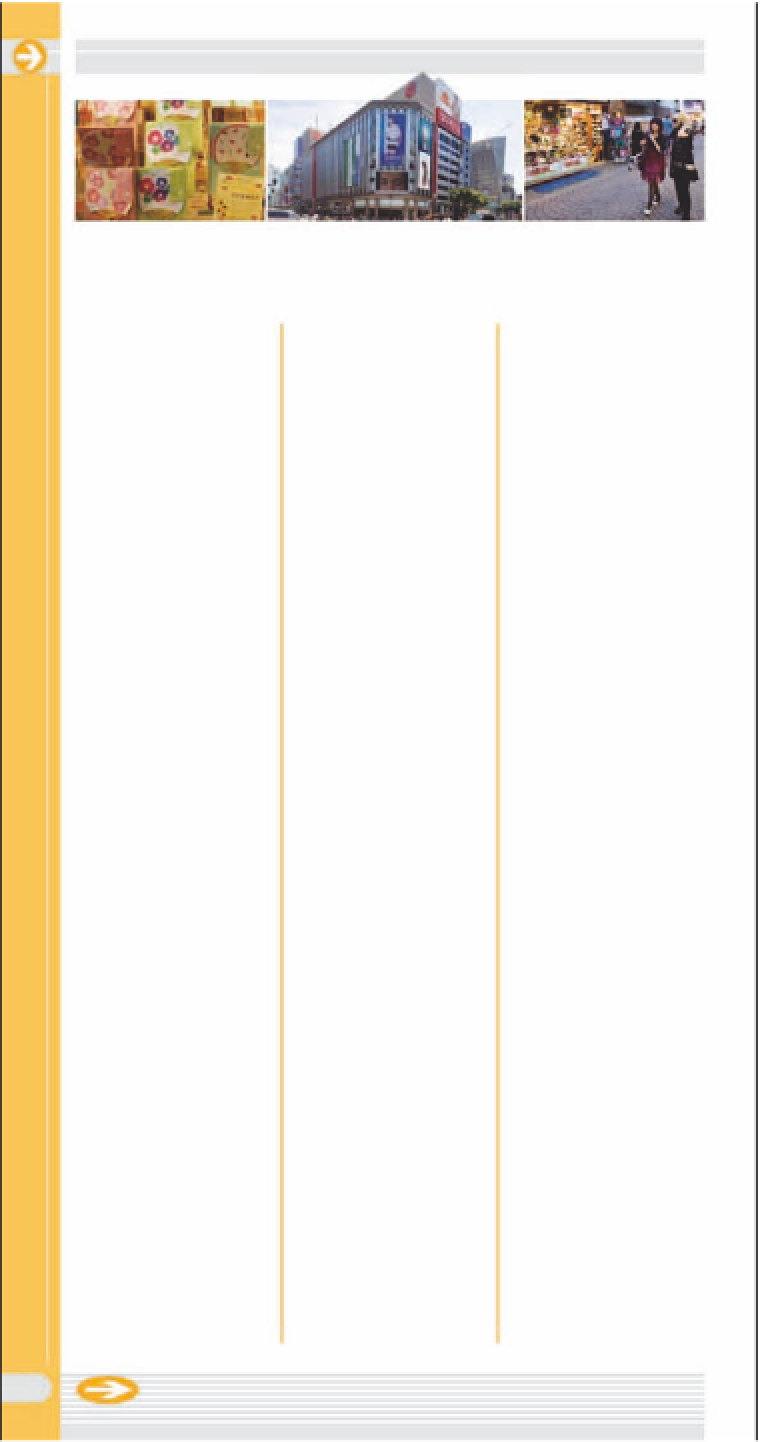Travel Reference
In-Depth Information
Left
An array of fans
Center
Mitsukoshi department store
Right
Takeshita-dori fashion street
Shopping Tips
!
What to Buy
%
Fashion Districts
*
Bookstores
In Tokyo, consumer
culture finds outlets
everywhere, with fashion
and food being the brand
areas the city excels
at. Craft stores sell cera-
mics, textiles, lacquer,
and paper goods.
Galleries and specialist
stores offer traditional as
well as modern artworks.
There are no hard and
fast rules about where to
shop, but Tokyo's fashion
districts tend to be quite
generational. Ginza and
Aoyama attract a middle-
aged, well-heeled crowd,
though some stores have
been making a bid for the
youth market. Harajuku
appeals to mid-teens,
Shibuya to high-teens to
those in their early 20s,
Shimokitazawa to the
college crowd, and Naka-
Meguro and Daikanyama
to 20- and 30-somethings.
Tokyo has several
excellent bookstores
stocking English titles.
The biggest are Maruzen
in Nihonbashi, the Oazu
complex in Marunouchi,
Kinokuniya's two stores in
Shinjuku
(see p50)
, and
the Yaesu Book Center
near Tokyo station. Tower
Records' bookstore
(see
p51)
is one of the best.
Good Day Books and
Blue Parrot sell used
books.
d
Good Day Books:
Map C2; 3F Asahi Building,
1-11-2 Ebisu, Shibuya-ku
• Blue Parrot: Map C1;
Takadanobaba, JR Station
@
Shopping Hours
Individual shops and
department stores are
usually open from 10am
to 8pm. Some stores
stay open until 10pm.
Department stores are
open daily, smaller stores
may be closed on
Monday or Wednesday.
Most stores remain open
on national holidays and
Sundays. Christmas is not
a holiday, but many shops
close on New Year's Day.
^
Electronics,
Gadgets,
and Gizmos
Akihabara, or “Electric
Town,” as it is called, is
the world's largest elec-
tronic center, stocking
everything from portable
music units to robot pets
and toys, all at very
competitive prices. Big
stores can be found
close to other major
Yamanote line stations.
&
Department
(
Music
Tokyo has countless
new and used record
stores. Tower Records'
Shibuya store has six
floors of music. Nearby,
HMV is massive. If there
is something you missed
the first time round,
Shibuya and Shinjuku's
used CD and vinyl stores,
which includes Recofan
and Disk Union, may be
the place to find it.
)
Souvenirs, Arts,
£
Credit Cards
Japan has been slow
to take up the use of
credit cards, and it is use-
ful to carry some cash.
All the department stores,
large clothing chains, and
many souvenir stores
accept cards
(see p121)
.
Stores
Tokyo's department stores
are a great shopping expe-
rience. Typically, the first
floors sell women's cloth-
ing and accessories, with
mensware on the floor
above. Food basements
are known for their deli-
cacies. Stores are life-
style complexes, places
where people stop for
coffee or lunch, to relax
in a rooftop beer garden,
to take in an exhibition,
or join a culture class.
and Crafts
The well-stocked Oriental
Bazaar
(see p53)
is an
exellent gift store. The
Japan Traditional Craft
Center
(see p53)
sells
the work of craftsmen
from all over Japan.
Specialist stores include
Hara Shobo
(see p52)
for woodblock prints,
Isetatsu
(see p52)
for
paper, and Fuji Torii
(see p50)
for antiques.
$
Tax Refunds
Most department
stores and electrical
goods stores in places
such as Akihabara offer
tax exemptions for
purchases over ¥10,000.
After paying, take the
goods, your receipts,
and passport to the tax-
refund counter for
reimbursement.
124
Tokyo's department stores (
depatos
) also sell tickets for concerts
and exhibitions.



































